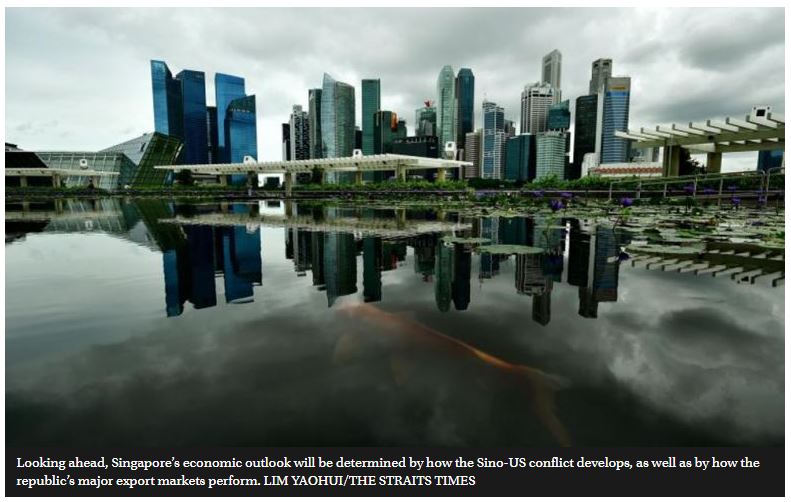Minister outlines plan for Singapore to navigate economic uncertainty
The weakened global economy has dampened consumer and business confidence, but there are pockets of strength in the Singapore economy, Trade and Industry Minister Chan Chun Sing told the House on Monday.
There will also be immediate challenges to weather, he noted, citing the fallout from trade tensions.
In addition, there is a need to “navigate more fundamental shifts in the global economy that will shape our medium to long-term prospects”, he added in reply to six members of parliament’s (MP’s) questions on the economy.
Chan also outlined the government’s strategies to manage these challenges and seize opportunities for Singapore and its people.
One key challenge – stresses to the multilateral trading system that Singapore has long benefited from.
“The risks of economic balkanisation, where markets are fragmented and bifurcated, and where trade, talent and data flows are disrupted, have grown,” he said.
“An increasingly protectionist global environment would reduce our access to markets.”
Another challenge is the emergence of global rules that might affect Singapore’s status as a global hub. For instance, ongoing discussions to have minimum effective tax rates across countries will affect the republic’s competitiveness. Carbon caps will constrain its growth potential.
“We must navigate all these very carefully to preserve our economic space,” the minister said.
Singapore must also be able to harness new technologies and create opportunities, especially in the digital economy, he added.
MP for Bishan-Toa Payoh Group Representation Constituency (GRC) Saktiandi Supaat asked about the likely impact of the Sino-US trade war in Singapore, and Workers’ Party (WP) chief Pritam Singh, who is also an MP for Aljunied GRC, asked which sectors are most vulnerable to trade tensions.
Chan noted the Sino-US dispute has gone beyond retaliatory tariffs to areas such as restrictions on technology access and sales. But it is one of three key uncertainties, the other being the risks of a disorderly Brexit and political uncertainties of some regional economies.
“All these have dampened consumer and business confidence,” he said. “Lower demand in our key export markets has in turn affected our outward-oriented sectors such as electronics, precision engineering and wholesale trade, whose performance remains weak.”
But there are pockets of strength, particularly in the information and communications sector which is expected to grow, given firms’ robust demand for IT and digital solutions.
Looking ahead, Singapore’s economic outlook will be determined by how the Sino-US conflict develops – with prolonged tensions undermining global business and consumer confidence further – as well as by how the republic’s major export markets perform.
China’s economy could also slow more sharply than expected due to the trade conflict, dampening its import demand from the region.
Responding to WP chairman Sylvia Lim (MP for Aljunied GRC), who asked how Singapore is managing the risk of a global trade war, and Seah Kian Peng (MP for Marine Parade GRC), who wanted to know how the government is cushioning its impact, Chan outlined the country’s three-pronged strategy.
First, Singapore will strengthen the fundamentals that have set it apart from competition, such as its stable political environment and connectivity in supply chains and distribution networks. These include non-physical dimensions like finance and data.
Second, it will constantly refresh its business offerings. For example, the country is developing new sectors such as agri-tech, which can create new jobs in agriculture, and precision medicine, which uses data to more accurately predict, diagnose or treat diseases.
Third, Singapore will do its part to promote a conducive global and regional business environment.
This includes its efforts to co-develop international trade rules for the digital economy, as well as deepening and diversifying trade links through ongoing negotiations for trade pacts like the Regional Comprehensive Economic Partnership, set to form the world’s largest free trade area.
“While there are clouds looming, we believe we are well-placed to weather the storm,” said Chan.
“Our economic fundamentals are sound, we are in a strong fiscal position, and we are making good progress in restructuring our economy.” THE STRAITS TIMES (SINGAPORE)


 Thailand
Thailand




